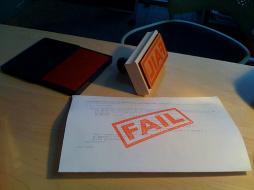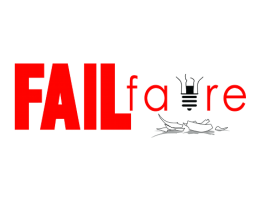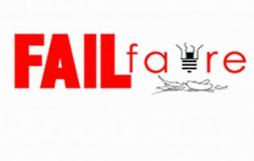FAILfaire
Posted by AnneryanHeatwole on Dec 16, 2011
FailFaire – where it's okay to admit the mistakes. MobileActive hosted another round of FailFaire, bringing together practitioners, developers, donors, and students involved in the use of technology for social change development to discuss what's usually swept under the rug – project failure. The event is an open space to discuss those projects that went wrong in our field fostering a sense of learning from mistakes and knowledge sharing. The latest FailFaire in New York brought together eight practitioners to present their failed projects and what they learned along the way. Take a look at this FastCompany article about the NYC FailFaire for some background.
So, here we bring you...
Posted by KatrinVerclas on Dec 14, 2011
Editors Note: We started Failfaire almost two years ago to create a space where it was ok to be honest in our field of "tech for social change," and admit that many projects that we all undertake do not succeed. Today is yet another Failfaire here in New York where practitioners come together to discuss how and why our projects failed. We will be writing about this tomorrow to give you more on the #fails presented, but in the meantime were absolutely astounded today to see the following blog post from Daraja about their Maji Matone project. It takes guts (and foresight) to admit so publicly that this project has not succeeded. We wrote about Maji Matone here before. The project was designed to provide local accountability for water services by way of local, grassroots monitoring via SMS. The post below was oroginally published on Daraja's blog here and is reposted here with Daraja's gracious permission. We are grateful for the post, and for the honesty.
Maji Matone hasn't delivered. Time to embrace failure, learn, and move on
It is no secret that Daraja's Maji Matone programme has not lived up to expectations. In particular, despite considerable resources spent on promotional work - printing and distributing posters and leaflets, as well as extensive broadcasts on local radio - we haven't had the response from the community that we had hoped for. A six month pilot in three districts resulted in only 53 SMS messages received and forwarded to district water departments (compared to an initial target of 3,000). So we've made a decision - to embrace failure, learn and share lessons from the experience, and to fundamentally redesign the programme.
Admitting failure in this way is easy to support in theory, but much harder to do in practice. It may be
accepted practice in the for-profit world, but it's uncomfortable for a donor-dependent NGO. Would it be easier to continue half-heartedly with a programme that isn't working or close it down quietly and hope that nobody notices? Of course it would. But those approaches would not benefit anyone, wasting money and missing out on valuable opportunities to learn. So we're taking a different tack, embracing and publicising our failures, and trying to make sure we (and others) learn as much as possible from the experience
Posted by MarkWeingarten on Oct 28, 2011
The fourth FAILfaire, this time in New York City on December 14th, will be an evening dedicated to those tech and mobile projects that were designed to have a social impact but instead crashed, burned, and FAILED. FAILfaire NYC is presented by MobileActive.org and hosted by the U.S. Fund for UNICEF, with participation from UNICEF's Innovation Unit.
If you do not know about Failfaire, here is some background: Launched in early 2010, there have now been three FAILfaires, events designed to provide a platform for those working in online and mobile technology for social change to openly, honestly (and humorously) discuss our own failures.
As noted in the New York Times’ piece on FAILfaire, “Technology’s potential to bring about social good is widely extolled, but its failures, until now, have rarely been discussed by nonprofits who deploy it.” Well, FAILfaire is changing that, and is doing so in style. The format is informal, the discussions are rich, and the refreshments are adult and, well, refreshing.
Slate.com wrote that FailFaire “...[isn’t] about celebrating failure just for the sake of failure, but about taking lessons from each mistake and using them to create more efficient, economical, and accessible projects that could have a greater effect on a community.” We couldn’t agree more!
To join us, please RSVP here, as the event will fill up quickly.
If you like to be considered as a presenter for the next FAILfaire, go to failfaire.org and submit a note about your failed project and what we can learn from it.
Posted by AnneryanHeatwole on Aug 17, 2010
The Mobile Minute is back with a video explaining the M-PESA mobile money service, news about maternal health insurance via mobiles, an app that helps users determine if a hybrid or plug-in car will be useful to their lives, a report on why you might want to turn off the geo-tagging system on your mobile, and FailFaire in The New York Times.
Posted by anoushrima on Aug 17, 2010
So, you heard about FailFaire (and maybe even read the New York Times article about it). You liked the idea of learning from failure in a not-so-earnest setting and want to have your very own FailFaire, or you think that your organization could benefit from an internal event. Here are some tips for rolling your own.
Caveat: We have now organized two FailFaires (first in NYC, next in DC) for our community of practitioners who work with ICTs and mobiles for international development because that community is our audience. And part of our mission here at MobileActive.org is to help reduce redundancies, build capacity and advance the field. We also happen to work in an area of the NGO sector where failure is not often discussed, least of all honestly.
But the FailFaire concept can work for any field or, maybe just as helpfully, within any organization. (Note, of course, that some of the suggestions listed below will differ for an internal event, rather than a public one like ours.)
The FailFaire name and logo are licensed under a liberal Creative Commons, so feel free to use them. You do not need our permission. For tweeting, blogging and posting event pictures, we have used the hashtag ‚#failfaire. If you are running an event branded as FailFaire, feel free to drop us a line (or leave a comment) to let us know how it went.
Here are some thoughts and tips on how we've approached FailFaires.
1. Start with a lot of personal, old-fashioned, direct outreach for both participants and presenters
Identify those in your network who are more agile, and less bureaucratic and less resistant to talk about and learn from failure. Have many conversations to introduce/warm them up to the this radical new idea long in advance - perhaps before you've even set a date. Explain the concept, the goals, and the format of the event. Gauge whether there are enough supporters who will a) participate, and especially b) present. This process is critical in order to get to #2: You need buy-in, advocates, people who are into it early on.
2. Have the right people in the room
You want people who are there to learn, not to be voyeuristic; there to be constructive, not to be snarky or malevolent. People who genuinely care about their work and want to do better. People who are ok with some irreverence and humor, because failure is hard to talk about without it. This type of event is great for building (or strengthening) community, so try to keep the audience targeted and relevant to your focus or topic. Promote the event among people you think will get the most out of it - those who value different ways of learning.
Posted by KatrinVerclas on Jul 02, 2010
We are very pleased to announce FAILFaire DC, in collaboration with the World Bank Institute: Innovation Practice. FAILFaire DC will take place on July 26th at the Bank. We will feature again, as we did in New York, mobile-for-development and other technology-for-development projects that failed. Join us for lightening talks that focus on the learnings of the projects – and what can be done differently in the future.
We have some presenters already from the Bank and from various NGOs who will be presenting their failures but we encourage you to submit a failure here if you like to be considered for a talk during the event. The format is informal, and we will provide refreshments and drinks. We are looking forward to learning from failure in DC!
Posted by ChristopherFabian on Apr 28, 2010
Or: Why the 1 Million T-Shirts x Twitter is the most important thing happening in Tech4Dev on Wednesday, 28 April 2010.
This is how realtime information will inform the future of development work.
A guy came up with an idea: "Let's collect 1 million t-shirts from the US and send them to Africa." Ok. It's an obviously bad idea. It's probably a viral promotion for his own company. It was covered by Mashable on Tuesday the 27th of April. None of this is revolutionary.
The guy social-mediazed his "idea". That's how you go viral. "Hey, twitter, facebook, THE INTERNETS...let's collect 1 million t-shirts...." This is what one does, these days. Make it public, and put it out there. It's an idea for "aid" to "Africa." Why not. It's got a hokey website that said (as of Wednesday, 28 April) "625 shirts collected." Inflamatory. engaging. Also not revolutionary.
| 1 Million Tweetshirts - How to Fail Fast and With Scrutiny data sheet 13545 Views |
| Countries: |
United States
|
Posted by ithorpe on Apr 16, 2010
On Wednesday evening I was lucky enough to attend the first ever "Failfaire", organized by MobileActive.org where several brave souls agreed to present their failed "Information Technology for Development" projects, explaining why they failed and what they learned from them.
I work on knowledge management in UNICEF, and have a strong interest in improving how we learn from our experience. This event (which was certainly not a failure!) was interesting to our work from at least two points of view:
1. The lessons learned from the projects themselves
2. The idea for the event itself and whether this might be something we could try ourselves.
There were four presentations during the meeting:
Bradford Frost presented on Mobileimpact.org a project to recycle old cellphones and donate them to Africa.
Posted by AnneryanHeatwole on Apr 14, 2010
As we here at MobileActive.org have been covering ICT and mobiles for development now for more than five years, we have seen our fair share of failures. For every great project that changes how a community benefits from technology to improve the lives of its people, there seem to be twice as many projects that fail, and end up wasting time, money, and maybe worst, goodwill.
Too often in our field, we talk up our successes, overhype and overestimate the value of our projects, and sweep the failures under the rug. But, if we don’t talk about what didn’t work (and, perhaps more importantly, why it didn’t work), others will keep repeating the same mistakes.
That is why we invented FailFaire, a gathering that is happening tonight in New York City and that we hope will take place in other cities around the world. FailFaire is a place where it's ok to talk about what didn't work to learn from for the next project using mobiles for social change and development.
Posted by AnneryanHeatwole on Mar 22, 2010
Calling all failures! On April 14 we're hosting the first FAILfaire featuring a close look at ICT and mobile development projects that have crashed, burned, and simply FAILED.
While we often focus on highlighting successes and gains in this field, it's no secret that many projects just don't work - some aren't scalable, some aren't sustainable, some can't get around bureaucratic hoops, and many fail due to completely unanticipated barriers. FAILfaire is a platform to openly and honestly discuss failures so that we can learn from what hasn't worked in the past in order to make our future projects stronger and better.
This is where YOU come in. Have you been a part of a project that flopped? Maybe the project used the wrong technology for its region. Maybe it didn't engage the intended community. Did not take culture, people, or both into consieration. Or maybe the rollout was too rushed. Whatever the reason, we want to hear from you.
| Presenting the First-Ever FAILfaire: Join Us! data sheet 4292 Views |
| Countries: |
United States
|





